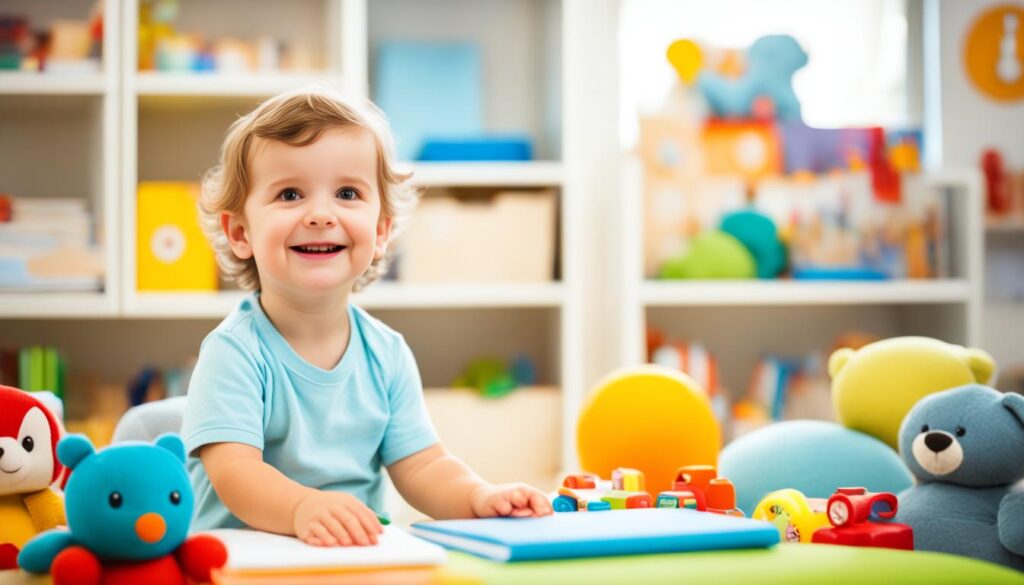Pediatric care is crucial for healthcare, focusing on the needs of infants, children, and adolescents. It covers medical care, early intervention, and preventive measures. Pediatric care ensures the health and well-being of our kids. It helps in early detection and intervention of developmental delays and congenital conditions.
It also looks at preventive measures to stop illnesses, injuries, and infectious diseases. Through immunizations and health screenings, it builds a healthy future. It reduces the chances of health complications and supports healthy development.
Key Takeaways : Pediatric Care For Children Health
- Pediatric care focuses on the unique healthcare needs of infants, children, and adolescents.
- Early detection and intervention are crucial for addressing developmental delays, congenital conditions, and health issues.
- Preventive measures, such as immunizations and health screenings, help protect children from illnesses and injuries.
- Pediatric care emphasizes the importance of supporting a child’s physical, cognitive, and emotional well-being.
- Regular well-child visits and developmental assessments enable healthcare professionals to identify and address potential concerns early on.
Introduction to Pediatric Care
Pediatric care involves looking after infants, children, and teens. It covers various services to ensure their health and well-being. This type of care is vital for the growth and health of young people.
Definition of Pediatric Care
It’s a special area of medicine that deals with kids’ unique health needs. Professionals like pediatricians handle everything from common illnesses to complex conditions in infants, children, and adolescents. They make sure every child gets the right care for their stage of life.
Importance of Pediatric Care for Child Development
Pediatric care is vital for children’s health. Regular check-ups and early help are key in their growth. By working with families, pediatricians catch problems early and keep children healthy.
Pediatric primary care and seeing specialist pediatric doctors help children grow up healthy. This method involves the whole child, supporting their body and mind. Families learn from this team and take an active role in their child’s health.
Early Detection and Intervention

Pediatric care is all about catching issues early and taking action. Doctors look out for developmental, cognitive, or physical concerns in kids. They do this by checking how kids are growing and learning in their early years.
Developmental Screenings and Assessments
At check-ups, doctors do developmental screenings. They test different areas of a child’s growth like moving, speaking, thinking, and feelings. Finding any issues early means kids can get help quickly.
Identifying Congenital Conditions and Delays
Pediatricians are also on the lookout for congenital conditions and health problems. They use exams and tests to spot and deal with things like slow development or genetic issues. Catching these problems early can make a big difference in a child’s life.
Focusing on early action, pediatric care aims to find and fix problems soon. This leads to better chances for kids to grow up healthy and strong.
Preventive Measures and Immunizations

Pediatric care helps keep children safe from sickness, injury, and diseases. A key part is giving children vaccines when they are young. These vaccines, like ones for measles and flu, help the body fight off dangerous illnesses.
Vaccination Schedules and Benefits
Doctors and families work together to get kids the right shots at the right times. Following the vaccine schedule is very important. It makes sure the kids’ bodies are ready to fight illnesses. This keeps everyone healthier.
Health Screenings and Anticipatory Guidance
Regular check-ups and guidance are also big parts of keeping kids healthy. These visits include checking how the child is growing and learning. It helps spot any problems early. Then, the doctors can give the right care fast.
Growth and Development Monitoring

Pediatric care is all about keeping an eye on how kids grow and develop. They check if kids are hitting the right milestones. This includes measuring how tall they are, how much they weigh, and their BMI. These checks tell a lot about a kid’s health and growth.
Tracking Physical Growth Milestones
At the doctor’s office, kids get measured for height and weight checks. These measurements help doctors see how kids are growing physically. They use growth charts to spot any issues early, like if a kid’s not growing as they should. Watching over a child’s growth helps catch and fix health problems early on.
Cognitive and Social-Emotional Development
Doctors also look out for how kids are doing mentally and emotionally. They do tests to check if kids are learning and behaving as expected. Early checks can catch problems with learning, like trouble with language or solving problems. Then, the right help can be given early, helping kids do better as they get older.
| Developmental Milestone | Age Range | Key Indicators |
|---|---|---|
| Gross Motor Skills | 0-12 months | Lifting head, rolling over, sitting up, standing, walking |
| Fine Motor Skills | 6-24 months | Grasping objects, using utensils, turning pages in a book |
| Language Development | 0-36 months | Cooing, babbling, first words, following simple instructions |
| Social-Emotional Skills | 0-60 months | Responding to affection, showing attachment, expressing emotions |
Watching how kids grow and learn helps doctors find and fix problems early. This supports good child healthcare and the well-being of children. It shows the importance of paying attention during pediatric visits.
Pediatric Care For Children Health
Pediatric care is very important for kids. It helps manage their sickness and heal their injuries. Kids often get sick from things like colds, ear infections, allergies, and skin problems. Pediatricians know how to treat these issues. They make sure kids get better fast and stay healthy.
Managing Common Childhood Illnesses
Kids’ doctors are experts in many illnesses, from the common cold to serious diseases. They figure out what’s wrong, give the right medicine, and take good care of them. This helps children who have trouble breathing because of sickness like the flu or asthma. They also help with ear problems, skin issues, and allergies.
Treating Injuries and Providing First Aid
There are times when kids hurt themselves. Pediatricians are ready to help with these injuries. They do first aid, check how bad the injury is, and then act. They’ll either treat it quickly or send the child to a specialist. This care includes cuts, bruises, sprains, and broken bones. They make sure kids heal well without any long-lasting problems.
Promoting Healthy Lifestyle Habits

Pediatric care focuses on starting healthy habits early. This approach helps kids learn positive behaviors. These habits stay with them through life, boosting their well-being.
Nutrition Education and Dietary Guidance
Pediatric healthcare teams are big on nutrition education. They show parents and kids what good nutrition means. They recommend a diet filled with fruits, veggies, whole grains, and lean proteins.
They also stress the importance of limiting unhealthy foods. By doing this, they prevent issues like obesity and poor nutrition.
Encouraging Physical Activity and Exercise
Being active is key for children’s health and growth. Pediatric care providers urge families to find fun ways to move. This could be through play, sports, or exercise routines.
Such activities help kids stay fit and build skills. They also promote good cardiovascular health. These benefits last into adult life.
Establishing Healthy Sleep Patterns
Getting enough quality sleep is vital for kids. Pediatricians encourage healthy sleep routines. This includes sticking to bedtime schedules and limiting screen time before bed.
They offer advice tailored for each age. This helps families make sure their kids sleep well for good health and development.
Mental Health and Emotional Well-being

Kids’ emotional and mental health really matter. It’s key for their overall health. Pediatricians are ready to look for signs of anxiety, depression, ADHD, and more.
Screening for Behavioral and Emotional Issues
At routine check-ups, doctors use special tools to see how kids are doing emotionally and socially. This helps find any problems early, so they can get help fast. Early help means fewer issues later on with school and friends.
Access to Mental Health Services
Pediatric teams make sure kids and families can get to mental health help they need. They might send kids to therapists or special clinics. This is big for the kids’ mental well-being and helps them get better.
Long-Term Impact on Health Outcomes
The importance of pediatric care goes beyond just kids’ health. It helps set the stage for their future well-being. The early steps, preventive measures, and learning healthy habits are key to better health outcomes later in life.
Preventing Chronic Diseases and Health Risks
Pediatric preventive care focuses on starting good habits and behaviors. This helps lower the chance of chronic diseases and health issues when they’re older. With routine check-ups, screenings, and advice from pediatricians, doctors catch and handle problems like childhood obesity, diabetes, and heart issues early on.
Establishing Healthy Habits for Adulthood
Starting healthy habits early is very important. Pediatric care teaches kids about good nutrition, the importance of exercise, and getting enough sleep. By teaching these things from the start, healthcare for kids helps them lead a healthier life as they get older.
| Benefit | Description |
|---|---|
| Chronic Disease Prevention | Pediatric preventive care helps find and deal with health issues early. This lowers the risk of chronic conditions later on, like obesity, diabetes, and heart problems. |
| Healthy Habit Formation | Pediatric care encourages the start of positive habits. This includes eating right, staying active, and sleeping well, which help even as kids grow up. |
| Long-Term Well-Being | Early intervention and teaching healthy habits set kids up for a good adult life. Pediatric care is vital for long-term health and happiness as they become adults. |
Collaboration and Coordination of Care
Providing effective pediatric care means working together. It involves many healthcare workers and parents. The team ensures children get great care by using the skills and knowledge of different experts.
Pediatric Healthcare Team Approach
The pediatric healthcare team is made up of several people. This includes a primary care pediatrician, nurses, and specialists like pediatric cardiologists or pediatric mental health professionals. They all work together.
This team helps every child, from simple check-ups to complex conditions. They share information and make plans to give the best care. Working together means children get the care that is right for them.
Involving Parents and Caregivers
Parents and caregivers are key in pediatric care. Doctors make sure they’re part of the team. They share information and support families.
This way, families learn to take care of their child at home. It helps children and families to be healthy. By working with parents, doctors make care better and more personal for each family.
Also Read : The Incredible Benefits Of Cycling Daily – A Guide For Beginners
FAQs
What is pediatric care?
Pediatric care means taking care of kids and young adults. Doctors provide medical help to keep them healthy and happy. They look at their minds, bodies, and emotions.
Why is pediatric care important for children’s health?
It’s key for children’s growth. Doctors find problems early and help kids stay safe from sickness. They also make sure children grow and develop well.
How does pediatric care support early detection and intervention?
Doctors check kids often to catch problems like learning or growth issues. Early signs of illness or trouble are found and dealt with quickly.
What are the preventive measures in pediatric care?
Doctors give kids shots to prevent sickness. They also talk to parents about how to keep kids safe, eat well, and be active. This all helps kids stay healthy.
How does pediatric care monitor a child’s growth and development?
Doctors regularly check if kids are growing well. They measure height, weight, and body mass. This helps make sure kids are healthy and developing the right way.
What role does pediatric care play in managing common childhood illnesses and injuries?
Pediatricians can tell what’s wrong when kids get sick or hurt. They treat things like colds, ear aches, and cuts. They help kids feel better fast.
How does pediatric care promote healthy lifestyle habits?
Doctors teach kids and their families how to eat well and be active. They also stress the importance of sleeping enough.
How does pediatric care address the mental and emotional well-being of children?
Looking after kids’ mental health is vital. Doctors watch for signs of stress, worry, or attention problems. They help these kids get the right help.
What is the long-term impact of pediatric care on health outcomes?
Early care and healthy habits during childhood set the tone for life. They help avoid diseases and keep adults healthy.
How is pediatric care delivered in a collaborative and coordinated approach?
Teamwork is crucial in pediatric care. Doctors, nurses, and specialists work together. Parents also play a big part in keeping kids well.
Source Links
- https://reddymedicalgroup.com/news/building-strong-foundations-the-vital-importance-of-pediatric-care/
- https://www.mysmartclinic.com/blog/the-importance-of-pediatric-care
- https://www.chcenters.org/why-is-pediatric-care-important/








Leave A Comment